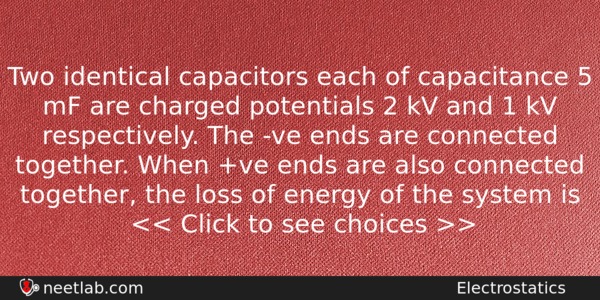| ⇦ | 
| ⇨ |
Two identical capacitors each of capacitance 5 mF are charged potentials 2 kV and 1 kV respectively. The -ve ends are connected together. When +ve ends are also connected together, the loss of energy of the system is
Options
(a) 160 J
(b) 0 J
(c) 5 J
(d) 1.25 J
Correct Answer:
1.25 J
Explanation:
No explanation available. Be the first to write the explanation for this question by commenting below.
Related Questions: - If |A x B|= √3 A.B , then the value of |A + B| is
- In the Young’s double slit experiment, a point P on the central bright fringe
- The temperature coefficient of resistance of an alloy used for making resistor is
- A block of mass 5 kg is moving horizontally at a speed of 1.5 m/s. A perpendicular force
- Two identical charges repel each other with a force equal to 10 mgwt they are 0.6 m
Topics: Electrostatics
(146)
Subject: Physics
(2479)
Important MCQs Based on Medical Entrance Examinations To Improve Your NEET Score
- If |A x B|= √3 A.B , then the value of |A + B| is
- In the Young’s double slit experiment, a point P on the central bright fringe
- The temperature coefficient of resistance of an alloy used for making resistor is
- A block of mass 5 kg is moving horizontally at a speed of 1.5 m/s. A perpendicular force
- Two identical charges repel each other with a force equal to 10 mgwt they are 0.6 m
Topics: Electrostatics (146)
Subject: Physics (2479)
Important MCQs Based on Medical Entrance Examinations To Improve Your NEET Score
18000+ students are using NEETLab to improve their score. What about you?
Solve Previous Year MCQs, Mock Tests, Topicwise Practice Tests, Identify Weak Topics, Formula Flash cards and much more is available in NEETLab Android App to improve your NEET score.
Share this page with your friends

Initially, the total electrostatic energy stored in two capacitors is Ui =1/2CV²1 + 1/2CV²2.
Initial charges on two capacitors are q1=CV1 and q2=CV2.
Let q′1 and q′2 be the charges on capacitors when the same terminals of two capacitors are connected to each other. By charge conservation
= q′1+q′2=q1+q2
The potential V′ across two capacitors is equal = q′1/C =q′2/C
Thus, q′1 = q′2 =(q1+q2)/2, and V′ = (V1+V2)/2
Thus, final electrostatic energy stored in the two capacitors is –
Uf = 1/2CV² + 1/2CV² = 1/4C ( V²1 + V²2 + 2V1V2)
and loss in energy will be = Ui − Uf = 1/4C(V1−V2)².